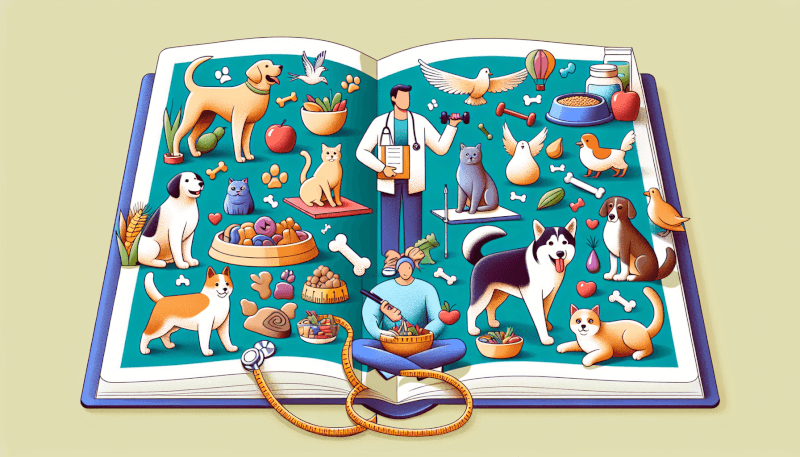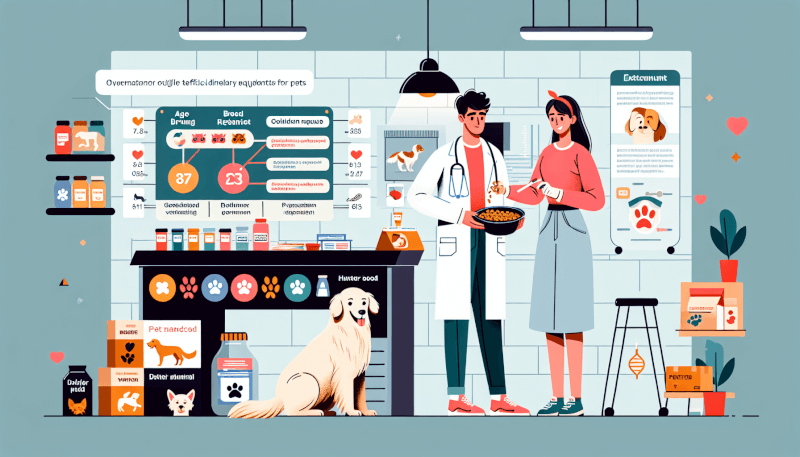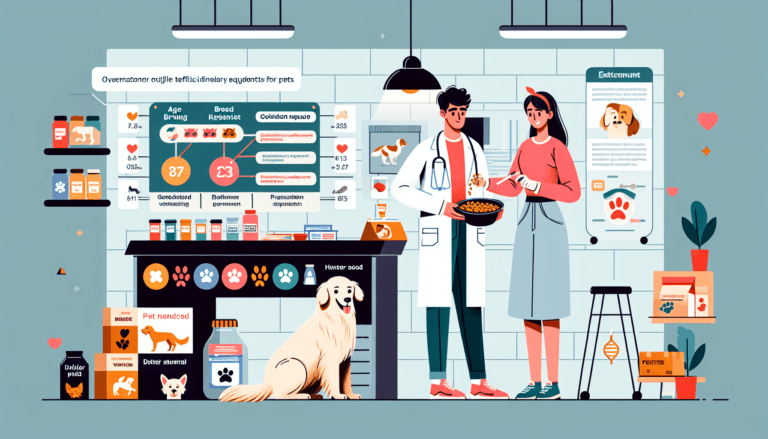Are you concerned about your furry friend’s well-being? Look no further! In this article, we will explore the world of pet health and nutrition, unraveling the secrets to ensuring your beloved companion stays healthy and happy. From understanding their dietary needs to tips on maintaining a balanced lifestyle, we’ve got you covered. So, read on to discover valuable insights that will keep your pet in the best shape possible!

Importance of Pet Health and Nutrition
Understanding the Connection
When it comes to the well-being of our beloved pets, their health and nutrition play a vital role. Just like humans, pets require a well-balanced diet that includes essential nutrients to maintain optimal health. A proper diet not only provides them with the energy they need to thrive but also supports their immune system, helps maintain a healthy weight, contributes to strong bones and teeth, and ensures a glossy coat. Understanding the connection between pet health and nutrition is crucial for every pet owner.
Ready for Cat Trivia?
Test your knowledge about cats!

Impact of Nutrition on Health
Proper nutrition plays a significant role in maintaining your pet’s overall health. A well-balanced and nutritious diet can help prevent many common health issues and support your pet’s immune system. On the other hand, a poor diet lacking essential nutrients can lead to a variety of health problems such as obesity, weak immune system, dental issues, digestive problems, and skin conditions. Therefore, it is essential to provide your pet with the right nutrients to support their overall health and well-being.
Common Health Issues Linked to Poor Nutrition
Poor nutrition can have a detrimental effect on your pet’s health. Some common health issues that can arise due to inadequate nutrition include obesity, diabetes, cardiovascular problems, dental diseases, gastrointestinal disorders, and dermatological issues. These health issues can significantly decrease your pet’s quality of life and may even lead to a shortened lifespan. By understanding the impact of nutrition on their health, you can take proactive steps to ensure your pet’s diet is well-balanced and meets their specific needs.
Essential Nutrients for Pets
Proteins
Proteins are an essential nutrient for pets as they provide the building blocks for healthy muscles, tissues, and organs. High-quality animal-based proteins, such as those from chicken, fish, and beef, are highly digestible and provide the necessary amino acids pets need for growth and repair. Protein sources should be the primary ingredient in your pet’s diet, ensuring they receive a sufficient amount to support their nutritional needs.
Carbohydrates
Carbohydrates are a vital source of energy for pets. They provide glucose, which is essential for fueling their daily activities. Whole grains, such as brown rice and oats, are excellent sources of carbohydrates for pets. However, it’s important to ensure that the carbohydrate content in your pet’s diet is balanced and does not exceed their energy requirements to prevent weight gain and other health issues.
Fats
Fats are an essential component of a healthy diet for pets. They provide a concentrated source of energy and help in the absorption of fat-soluble vitamins. Healthy fats, such as those from fish oil and flaxseed, also contribute to a shiny coat and healthy skin. It’s important to ensure that the fats in your pet’s diet come from high-quality sources and are provided in appropriate amounts to maintain a healthy weight.
Vitamins
Vitamins are crucial for your pet’s overall health and well-being. They play a vital role in various bodily functions, including immune support, bone health, and the maintenance of healthy skin and coat. Vitamins can be obtained from a well-balanced diet that includes a variety of fresh fruits and vegetables. However, it is important to note that some vitamins may require supplementation to meet your pet’s specific needs.
Minerals
Minerals are essential for the proper functioning of your pet’s body. They play a role in maintaining healthy bones, teeth, and muscles, as well as regulating various bodily processes. Important minerals for pets include calcium, phosphorus, magnesium, potassium, and iron. These minerals can be obtained through a balanced diet that includes high-quality ingredients and may also require additional supplementation based on your pet’s individual needs.
Water
Water is the most essential nutrient for pets. It is necessary for maintaining proper hydration, regulating body temperature, aiding in digestion, and flushing out waste products. Fresh and clean water should always be available to your pet at all times. Monitoring your pet’s water intake and ensuring they have access to an adequate supply is crucial for their overall health and well-being.
Dietary Requirements by Pet Type
Dogs
Just like humans, dogs have specific dietary requirements based on their age, size, activity level, and overall health. Generally, dogs require a diet that is rich in protein, moderate in fat, and includes carbohydrates from whole grains and vegetables. Puppies may have different nutritional needs compared to adult dogs, and older dogs may require a diet specially formulated for senior dogs. Consulting with a veterinarian can help determine the right diet for your dog’s specific needs.
Cats
Cats have unique nutritional requirements that are different from dogs. They are obligate carnivores, which means they require a diet that is primarily based on high-quality animal-based proteins. Cats also have specific needs for essential amino acids, such as taurine, which are vital for their overall health. Additionally, cats have a low thirst drive and may benefit from wet food or additional water sources to ensure proper hydration.
Birds
Birds have specific dietary needs that vary depending on their species. Seed-based diets are common but can be deficient in certain essential nutrients. A well-balanced bird diet should include a variety of fresh fruits, vegetables, and high-quality pellets that provide the necessary vitamins, minerals, and proteins. It’s essential to consult with a veterinarian or avian specialist to determine the specific dietary requirements for your bird.
Small Mammals
Small mammals, such as rabbits, guinea pigs, hamsters, and ferrets, each have their own specific dietary needs. Most small mammals require a diet that is high in fiber, low in fat, and includes a variety of fresh vegetables and hay. Pelleted food formulated specifically for each species can also be included in their diet. It’s important to research and consult with a veterinarian to ensure your small mammal’s dietary needs are met.
Reptiles
Reptiles have unique dietary requirements depending on their species. They can be herbivorous, carnivorous, or omnivorous. Some reptiles, such as turtles and tortoises, require a diet that includes a mix of leafy greens, vegetables, and some fruits. Others, like snakes, may require a diet consisting of whole prey items. It’s crucial to research and understand the specific dietary needs of your reptile species and consult with a reptile veterinarian or herpetologist for guidance.

Determining the Right Pet Diet
Age and Life Stage Considerations
The nutritional needs of pets change as they age from puppies or kittens to adults and eventually to senior pets. Puppies and kittens require a diet that supports their rapid growth and development. Adult pets have different nutritional requirements to maintain their overall health, and senior pets may have reduced calorie needs and specific nutrient requirements to support their aging bodies. It’s important to transition your pet’s diet gradually as they age and consult with a veterinarian to determine the appropriate diet for their life stage.
Breed and Size Specific Needs
Different dog breeds and sizes may have varying nutritional needs. Large breed puppies, for example, require a diet that supports their growth while minimizing the risk of skeletal issues. Small breed dogs may have higher energy requirements and benefit from smaller, more frequent meals throughout the day. Understanding your pet’s breed and size-specific needs can help you choose the right diet that supports their overall health.
Activity Level and Energy Requirements
The activity level of your pet plays a significant role in determining their energy requirements. Active dogs or working dogs may need a higher calorie diet to fuel their physical activities, while less active or sedentary pets may require a lower-calorie diet to prevent weight gain. It’s important to assess your pet’s energy needs and adjust their diet accordingly to maintain a healthy weight and overall well-being.
Special Dietary Needs (e.g., allergies)
Some pets may have specific dietary requirements due to allergies or food sensitivities. Food allergies in pets can manifest as skin irritations, gastrointestinal upset, or other health issues. Identifying and eliminating the allergen from your pet’s diet is crucial for their health and well-being. In some cases, a veterinarian may recommend a hypoallergenic diet or conduct an elimination diet to determine the specific ingredient causing the allergic reaction.
Choosing High-Quality Pet Food
Reading Pet Food Labels
When selecting pet food, it’s important to read and understand the information provided on the pet food labels. The label should include the ingredients, guaranteed analysis, feeding guidelines, and any other relevant information. Pay attention to the order of ingredients, as the first few ingredients listed are the most prevalent in the food. Look for high-quality protein sources, whole grains, and a balanced blend of nutrients.
Understanding Ingredient Lists
The ingredient list on pet food labels can give you valuable information about the quality of the food. Look for specific protein sources (e.g., chicken, beef) rather than generic terms like “meat.” Avoid foods that contain excessive fillers or artificial additives. Additionally, be cautious of ingredient splitting, where similar ingredients are listed separately to make them appear lower on the list. Understanding ingredient lists can help you make informed decisions about the quality of pet food.
Evaluating Nutritional Claims
Pet food manufacturers often make various nutritional claims on their packaging. Terms like “natural,” “holistic,” or “grain-free” may catch your attention, but it’s important to understand what these claims actually mean. Some claims have specific definitions set by regulatory bodies, while others may be marketing tactics. Consider consulting with a veterinarian or conducting thorough research to evaluate the nutritional claims made by pet food companies.
Avoiding Common Marketing Gimmicks
Marketing gimmicks can sometimes mislead pet owners into purchasing low-quality or unnecessary products. Claims such as “premium,” “gourmet,” or “scientifically formulated” can create the illusion of a higher-quality product. It’s important to look beyond marketing buzzwords and focus on the actual ingredients and nutritional content of the food. Being aware of common marketing gimmicks can help you make more informed choices for your pet’s diet.
The Role of Pet Supplements
Types of Supplements (e.g., joint health, skin and coat)
Pet supplements can be beneficial in certain situations to complement a pet’s diet and enhance their health. There are a variety of supplements available, such as joint health supplements for older pets or those with arthritis, and skin and coat supplements to promote a healthy coat and reduce shedding. Other supplements may target specific health concerns, such as digestive health or immune support. It’s important to consider your pet’s individual needs and consult with a veterinarian before incorporating supplements into their diet.
Benefits and Risks
Pet supplements can provide various benefits depending on the specific supplement and the individual needs of your pet. They can support overall joint health, aid in digestion, promote a healthy skin and coat, and boost the immune system. However, it’s important to be cautious when using supplements and to ensure they are safe and appropriate for your pet. Some supplements may interact with medications or have potential side effects. Consulting with a veterinarian can help you determine the benefits and risks associated with specific supplements.
Consulting with a Veterinarian
Before starting any pet supplements, it is crucial to consult with a veterinarian. They can evaluate your pet’s individual health needs and make specific recommendations based on their condition. Veterinarians have extensive knowledge about the benefits and risks of supplements and can guide you in choosing the right ones for your pet.
Recommended Supplements by Pet Type
The type of supplement that may be recommended for your pet depends on their individual needs. For example, senior dogs may benefit from joint health supplements containing ingredients like glucosamine and chondroitin to support their aging joints. Cats with dry or flaky skin may benefit from skin and coat supplements that provide essential fatty acids. It’s important to discuss your pet’s specific needs with a veterinarian to determine the most suitable supplements for their health.
Feeding Tips for Optimal Pet Health
Establishing a Regular Feeding Schedule
Maintaining a regular feeding schedule is essential for your pet’s overall health and digestion. Feeding your pet at consistent times each day helps establish a routine and prevents overeating or unnecessary snacking. It’s best to consult with a veterinarian to determine the appropriate feeding schedule based on your pet’s age, species, and individual needs.
Portion Control and Avoiding Overfeeding
Feeding your pet the right portion size is crucial to prevent obesity and other health issues. Many pet food packages provide guidelines on the recommended portion sizes based on your pet’s weight and activity level. However, it’s important to remember that every pet is unique, and their individual needs may vary. Monitoring their weight, body condition, and adjusting portion sizes accordingly can help prevent overfeeding and maintain a healthy weight.
Preventing Table Scraps and Human Food
Feeding your pet table scraps or human food can lead to several health risks. Human food is often high in fat, salt, and spices that can cause digestive upset or even toxicity in pets. It’s important to stick to a balanced and complete pet diet and avoid sharing your meals with your furry friend. If you want to provide treats, opt for pet-friendly alternatives that are specifically formulated for their dietary needs.
Introducing New Foods and Diet Transitions
When introducing new foods or transitioning to a different diet, it’s important to do so gradually. Abrupt changes in diet can lead to digestive upset and discomfort for your pet. Start by introducing small amounts of the new food mixed with their current diet, and gradually increase the proportion of the new food over a week or two. This gradual transition allows your pet’s digestive system to adjust and minimize any potential digestive issues.
Ensuring Fresh and Clean Water Supply
Providing your pet with fresh and clean water at all times is essential for their hydration and overall health. Ensure that their water bowl is cleaned regularly and refilled with fresh water daily. Monitoring their water intake can also be helpful in identifying any underlying health issues. If you notice a significant change in your pet’s water consumption, consult with a veterinarian for further evaluation.
Dealing with Common Pet Health Issues
Obesity and Weight Management
Obesity is a common health issue among pets and can lead to various health problems such as joint issues, diabetes, respiratory problems, and a reduced lifespan. Maintaining a healthy weight is crucial for your pet’s overall health and well-being. Regular exercise, portion control, and a balanced diet can help prevent and manage obesity. If your pet is overweight, consult with a veterinarian for guidance on weight management and a suitable diet plan.
Dental Care and Oral Health
Good dental care is essential for your pet’s overall health. Dental issues such as tartar buildup, gum disease, and tooth decay can lead to pain, infections, and even systemic health problems. Regular brushing of your pet’s teeth, providing dental chews or treats, and scheduling routine dental cleanings with a veterinarian can help maintain good oral health and prevent dental issues.
Digestive Problems and Food Allergies
Digestive problems, including diarrhea, vomiting, and food allergies, can significantly impact your pet’s quality of life. These issues may be caused by food intolerances, allergies, or dietary indiscretions. Working with a veterinarian to identify and eliminate potential allergens from your pet’s diet can help alleviate digestive problems. Additionally, providing a diet that is easily digestible and suitable for your pet’s specific needs can help support their digestive health.
Skin Conditions and Allergy Management
Pets can suffer from various skin conditions and allergies, which can cause itching, redness, dryness, and discomfort. Identifying the underlying cause of the skin condition, whether it be allergies, infections, or parasites, is crucial for effective treatment. In some cases, dietary changes or specific supplements may be recommended to support skin health and reduce allergic reactions. Consulting with a veterinarian or veterinary dermatologist can help determine the best course of action for managing skin conditions and allergies.
Joint and Bone Health
Joint and bone health is particularly important for older pets and large breed dogs. Arthritis and other joint issues can cause pain, stiffness, and decreased mobility. Providing a diet rich in joint-supporting nutrients, such as glucosamine and chondroitin, can help maintain joint health. Regular exercise, weight management, and targeted supplementation may also be recommended to support your pet’s joint and bone health.
Other Factors Affecting Pet Health
Exercise and Physical Activity
Regular exercise and physical activity are crucial for keeping your pet healthy and engaged. Dogs require daily exercise to burn off excess energy, maintain a healthy weight, and provide mental stimulation. Cats need playtime and opportunities for climbing and scratching to prevent obesity and encourage natural behaviors. Tailor your pet’s exercise routine to their specific needs, taking into account their age, breed, and overall health.
Environmental Enrichment
Providing environmental enrichment is essential for your pet’s mental and emotional well-being. Dogs and cats benefit from interactive toys, puzzle feeders, and playtime with their owners. Birds and small mammals may enjoy a variety of toys and activities that encourage natural behaviors. Enriching your pet’s environment helps prevent boredom, reduce stress, and promote a happier and healthier pet.
Stress Management
Pets can experience stress due to various factors, such as changes in routine, loud noises, separation anxiety, or the introduction of new pets. Chronic stress can have a negative impact on their health and well-being. Implementing stress management strategies, such as creating a safe and calm environment, using pheromone diffusers, or behavioral training, can help alleviate stress and promote a more balanced and relaxed pet.
Regular Veterinary Check-ups
Routine veterinary check-ups are essential for monitoring your pet’s overall health and identifying any potential issues early on. Regular examinations, vaccinations, and preventive care can help prevent illnesses and ensure your pet’s well-being. Your veterinarian can also provide advice on nutrition, behavior, and any specific health concerns based on your pet’s individual needs.
Vaccinations and Preventive Care
Vaccinations are vital in protecting your pet against infectious diseases. Keeping up with your pet’s vaccination schedule as recommended by your veterinarian is crucial for their health and preventing the spread of diseases. In addition to vaccinations, preventive care measures such as flea and tick control, deworming, and heartworm prevention should be a part of your pet’s healthcare routine. Consulting with a veterinarian will help ensure your pet receives appropriate vaccinations and preventive care measures.
Conclusion
Pet health and nutrition are of utmost importance for the overall well-being and longevity of your furry companion. Providing a well-balanced diet that includes essential nutrients tailored to their specific needs is the foundation of good pet health. Understanding the connection between nutrition and health, as well as recognizing common health issues associated with poor nutrition, empowers pet owners to make informed decisions about their pet’s diet. By considering factors such as age, breed, size, activity level, and any special dietary needs, pet owners can determine the right diet for their pets. Choosing high-quality pet food, incorporating supplements when necessary, and following best practices for feeding and healthcare, such as portion control, dental care, and regular veterinary check-ups, are all essential for ensuring optimal pet health. By prioritizing pet health and nutrition, you can provide your furry friend with the best chance for a happy, healthy, and fulfilling life.


